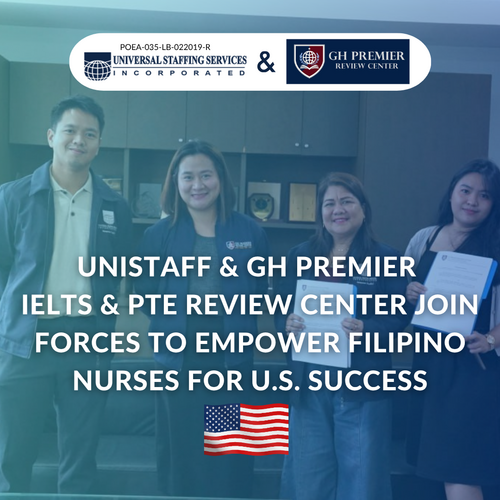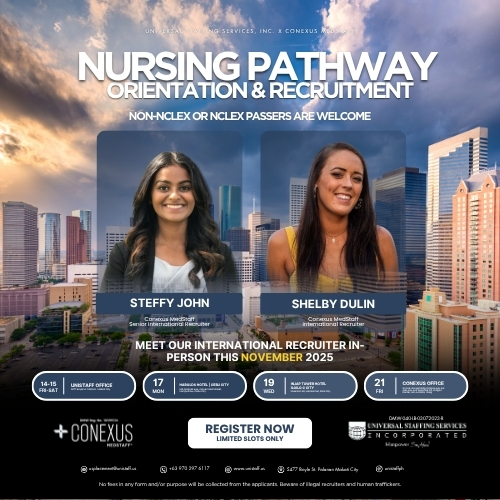Now You Know | Common Reasons for US EB-3 Visa Application Denials

If you’re working towards landing your dream job abroad, you’ve come to the right blog! Wherever you are in the process, we know how challenging it is. There is so much you need to know!
One of the biggest hurdles to getting a job abroad is an employment visa. And to receive a visa denial can be quite upsetting, given the amount of time and effort one puts in to submit everything required.
Today we’ll help international nurses like you to prevent having to face this stressful situation. We created this article to share insights on reasons for a US visa denial and how to avoid it. And if you read until the end, you’ll know exactly what to do, if it happens. Let’s get right into this installment of: Now You Know!
There are many stories about people getting their US EB-3 Visa or Employment Based Immigrant Visa denied. It is quite common. It can happen to a friend, a mutual friend, a family member or a colleague. Someone received a job offer as a registered nurse from a US employer. Then deep into the planning phase of migration to the US, they find out that somewhere along the final processes of their application, their visa was denied.
Visa denials are part of the process. Sadly, some cases are necessary to uphold a standard practice that applies to the different countries in which the US has opened its imigration services to. The US has a detailed and specific visa policy, according to the standards of which applications are approved or denied. Each application is carefully reviewed, and in general, most of the applicants are interviewed by a consul. To say that the process is strict is an understatement. It can get frustrating especially when applicants think that they have taken extreme care to comply with all requirements and follow all procedures.
Common Reasons for EB-3 US Visa Denials
Many people consider the US as the land of opportunity. It is a top destination for many aspiring international nurses. Every year, roughly half a million people from around the world receive their US immigrant visas. While a large number of applications still get denied.
A visa application might be considered unsuccessful if the consular officer fails to receive all the required information from the employer and the candidate.
There are a few common reasons for why an EB-3 green card petition was denied or rejected:

What does a visa denial under INA section 221(g) mean?
A visa denial under INA section 221(g) means:
-
The applicant did not present to the consul a complete application with all the necessary information
-
Supporting documentation was missing
This does not mean that the application has been completely rejected. There is still an opportunity to correct any mistakes discovered and provide the embassy with the missing information or supporting documents before a final decision on the case is made.
What happens next?
Upon being informed that the application is incomplete:
-
The candidate will receive a letter that will specify the exact reasons for being found ineligible, and what document or information is missing
-
The candidate will then have to provide whatever is missing as soon as possible
-
After submission, the visa application can then be processed to determine whether the candidate qualifies for a visa.
Like what you’re reading so far? Click below to be in-the-know!
Subscribe now to receive informative newsletters just like this one!
Position did not satisfy requirements for the EB-3 green card

Depending on what type of visa is applied for, the eligibility and requirements may differ. Here are the categories eligible for the EB-3 visa, also known as Immigrant Visa Preference Categories:
-
Skilled workers are persons whose jobs require a minimum of 2 years training or experience, not of a temporary or seasonal nature. The skilled worker must meet the educational, training, or experience requirements of the job opportunity. Relevant post-secondary education may be considered as training.
-
Professionals are persons whose job requires at least a US baccalaureate or foreign equivalent degree and are a member of the professions.
-
The Other Workers subcategory is for persons performing unskilled labor requiring less than 2 years training, education, or experience, not of a temporary or seasonal nature.
Eligibility requirements also include demonstrating the ability to perform work for which qualified workers are not available in the United States.
What to remember:
-
Be sure to fulfill the requirements and meet the conditions for a particular visa
-
Legitimate work certificates and documents are necessary
-
Never falsify documents since this could lead to profession-related questions
Employer did not satisfy requirements for the EB-3 green card

This case can feel quite disappointing on the part of nurses. If applicants have taken the time and effort to fulfill every requirement, but the petitioner (US employer) was not able to meet the minimum requirements, then it can be twice as frustrating.
If a US employer (petitioner) failed to demonstrate a continuing ability to pay the offered wage as of the priority date using an annual report, federal income tax return, or audited financial statement, the visa application will be denied (refused), and the candidate will be provided a reason for the denial.
A petitioner or US employer who is willing to sponsor the beneficiary must have extended a valid job offer to the foreign national. The US employer must be able to prove that there is a shortage of American workers who could and would do the job. This is proven by submitting a labor certification. The US employer must have a valid employer-employee relationship with the beneficiary. This means that the employer must be able to compensate and supervise the beneficiary.
PRO TIP: If you’re looking to work in the United States as a healthcare professional, it is possible only with a working visa petitioned by a credible employer.
What are the options?
Upon being informed that the employer did not satisfy requirements:
-
Stay focused on the goal of securing a job in the US
-
Work with a POEA-licensed staffing agency to find the latest job opportunities
-
Do research on secure US employers to verify their credentials and reputation
What to do in the event of a visa denial?
A candidate’s visa denial does not put an end to their dreams of working in the US. In fact, candidates can reapply, many of which successfully get approved and receive their visas on their second (or even third!) application.
Here are 5 things to remember in the event of a visa denial:
-
Pause. Having a calm and clear mind is better for planning and carrying out the actions needed next
-
Understand the reason for denial
-
Submit any missing documents or information
-
Explore new options to pursue US job opportunities, if needed
-
Stay focused on the goal - remain vigilant throughout the reapplication process
Now you know!
You have taken a valuable step towards preventing a visa denial by understanding the common reasons for why they happen! If you’re still reading, then you certainly know what you need to get better prepared during your application process. You can confidently work with your agency and employer to identify and prevent any critical mistakes before they occur. You can also calmly move forward and take productive steps toward managing a visa denial, if it happens.
The US State Department provides a list of ineligibilities, so you can learn about more specific reasons.
Good luck! Securing your dream job is not easy. But nothing in life worth doing ever really is. Plus, you can always accomplish more and get closer to reaching your goals with the right support - you know where to find us!
No better time than now! This is the sign you’ve been waiting for. Learn more about the United States Candidate Development Program (USCDP) and discover how it can bring you closer to your US dream job.
Sources:
https://travel.state.gov/content/travel/en/us-visas/visa-information-resources/waive0rs.html
https://travel.state.gov/content/travel/en/us-visas/visa-information-resources/waivers.html#visa








